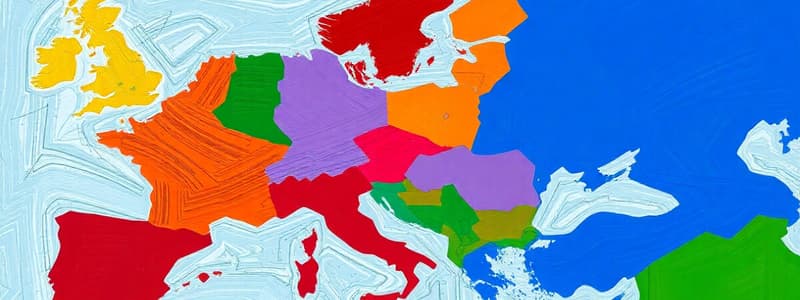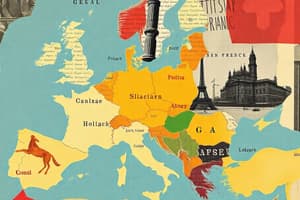Podcast
Questions and Answers
What is the arrangement of events in order of occurrence called?
What is the arrangement of events in order of occurrence called?
- Geopolitics
- Political regions
- Chronology (correct)
- Historical sources
What defines a nation-state?
What defines a nation-state?
- A political entity with a defined territory and government (correct)
- A group of people sharing the same culture
- An area with fluctuating political power
- A region characterized solely by natural boundaries
Which of the following best describes globalization?
Which of the following best describes globalization?
- The practice of traditional diplomacy
- The establishment of national borders
- The isolation of countries from one another
- The growing interdependence of countries worldwide (correct)
What is the primary purpose of the scientific method?
What is the primary purpose of the scientific method?
Which of the following is NOT a branch of science?
Which of the following is NOT a branch of science?
Which mathematical operation is concerned with finding the total of two or more quantities?
Which mathematical operation is concerned with finding the total of two or more quantities?
What is the study of shapes, sizes, and properties of space called?
What is the study of shapes, sizes, and properties of space called?
What mathematical concept involves the study of continuous change?
What mathematical concept involves the study of continuous change?
Study Notes
History
- Definition: The study of past events, particularly in human affairs.
- Key Concepts:
- Chronology: The arrangement of events in order of occurrence.
- Historical sources: Primary (firsthand accounts) and secondary (interpretations of primary sources).
- Major periods: Prehistoric, Ancient, Medieval, Modern, Contemporary.
Political Geography
- Definition: The study of the relationship between politics and geography.
- Key Concepts:
- Nation-state: A political entity characterized by a defined territory and government.
- Borders: Geographical boundaries that can be natural (rivers, mountains) or artificial.
- Geopolitics: How geographic factors influence political power and relations.
- Political regions: Areas defined by political characteristics (e.g., electoral districts, administrative regions).
Current Affairs
- Definition: Events of political or social significance happening in the present.
- Key Concepts:
- Globalization: The increasing interconnectedness of the world, impacting economics, culture, and politics.
- International relations: The study of interactions between countries, including diplomacy and conflict.
- Major issues: Climate change, immigration, trade disputes, and global health (e.g., pandemics).
Science
- Definition: A systematic enterprise that builds and organizes knowledge in the form of testable explanations and predictions about the universe.
- Key Concepts:
- Scientific method: A process of experimentation and observation to draw conclusions.
- Branches of science: Physical sciences (e.g., physics, chemistry), life sciences (e.g., biology), and social sciences (e.g., psychology, sociology).
- Importance of peer review: Validates research and ensures accuracy.
Maths
- Definition: The abstract science of number, quantity, and space, either as abstract concepts (pure mathematics), or as applied to other disciplines (applied mathematics).
- Key Concepts:
- Basic operations: Addition, subtraction, multiplication, division.
- Algebra: Use of symbols to represent numbers in equations.
- Geometry: Study of shapes, sizes, and properties of space.
- Calculus: Mathematical study of continuous change, involving derivatives and integrals.
- Statistics: The study of data collection, analysis, interpretation, and presentation.
History
- Study of past events with a focus on human activities.
- Chronology arranges events sequentially according to when they occurred.
- Historical sources are categorized into primary sources (firsthand accounts) and secondary sources (interpretations of primary sources).
- Major historical periods include Prehistoric, Ancient, Medieval, Modern, and Contemporary.
Political Geography
- Focuses on the interplay between politics and geography.
- Nation-state is defined as a political entity with specific territorial boundaries and a governing body.
- Borders can be natural (like rivers or mountains) or artificial and define the limits of political entities.
- Geopolitics examines how geographical factors shape political influence and international relations.
- Political regions are identified by distinct political characteristics, such as electoral districts and administrative divisions.
Current Affairs
- Refers to significant political or social events occurring in the present time.
- Globalization describes the growing interconnectedness between countries, affecting economics, culture, and political structures.
- International relations analyze the interactions between nations, covering topics such as diplomacy, cooperation, and conflicts.
- Major contemporary issues include climate change, immigration challenges, trade disputes, and global health crises like pandemics.
Science
- Systematic study that develops and organizes knowledge through testable explanations and predictions about the universe.
- Scientific method emphasizes experimentation and observation as tools for drawing valid conclusions.
- Major branches of science include physical sciences (physics, chemistry), life sciences (biology), and social sciences (psychology, sociology).
- Peer review is a critical process that assesses research for accuracy and ensures reliability in scientific findings.
Maths
- Abstract science exploring numbers, quantity, and spatial relationships, both in theoretical (pure mathematics) and practical applications (applied mathematics).
- Basic operations are foundational: addition, subtraction, multiplication, and division.
- Algebra involves representing numbers with symbols to form equations for problem-solving.
- Geometry focuses on the study of shapes, sizes, and properties of space.
- Calculus investigates continuous change through derivatives and integrals, with applications in various fields.
- Statistics is the discipline of collecting, analyzing, interpreting, and presenting data effectively.
Studying That Suits You
Use AI to generate personalized quizzes and flashcards to suit your learning preferences.
Description
Test your knowledge on key concepts of history and political geography. This quiz covers important definitions, major periods in history, and the interplay between geography and politics. Prepare to explore how past events and geographical factors shape our current affairs.




